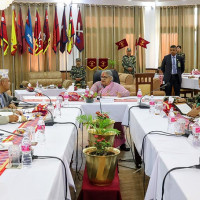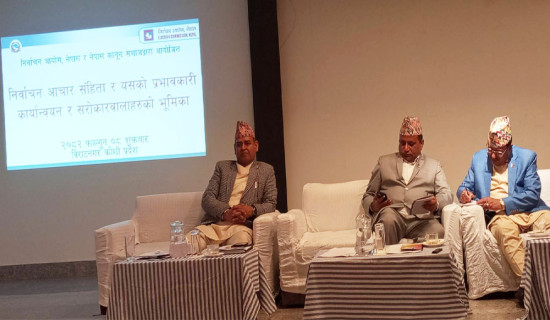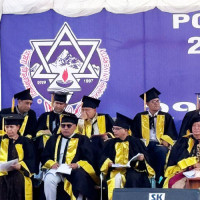- Saturday, 21 February 2026
Women Entrepreneurs Need Support
Of the 6.66 million households, 31 per cent headed by women members of the family, and more than 51 per cent of the population are women, but only 23.8 per cent of them own a piece of land or a house. However, this achievement is the result of the impact of foreign employment and the split in the family, primarily in the districts affected by the 2015 Gorkha earthquake, where families were broken apart to claim the housing grant of Rs. 300,000 offered by the government for reconstruction of the house damaged in the tremors. Likewise, 31 women per 100 cannot read and write, while the number of males who are illiterate is 16 per 100, according to the National Census 2021.
Similarly, the Economic Census 2018 showed that about 29.8 per cent of the total 923,356 business firms run in the country were owned or managed by women. But women-run businesses earn slightly above a quarter of the business firms managed by men; female-led businesses earn an average annual profit of Rs. 343,000, which is quite modest compared to the average profit of Rs. 1.2 million of the male-led enterprises.
Since informality incidence is high among women-run firms, they are deprived of various offers, benefits, and discounts announced by the government and Nepal Rastra Bank. For example, many informal businesses couldn't obtain facilities like discounts and wave-offs on bank interest rates, refinancing, and other subsidies, as such facilities were available only to formal businesses. Many cottage and small entrepreneurs neither know about the funds and support mechanisms created by the government nor have access to them. During the recent economic slowdown, a substantial number of micro-cottages and small enterprises managed by women had to shut down temporarily or permanently, as estimated by the Federation of Nepalese Chambers of Commerce and Industry (FNCCI). The impact of this economic hit is not only affecting men but also women in their attempts to venture into entrepreneurship.
This reality underscores the need to promote the participation of women in business and industries, not only to economically empower women but also to create an equitable and just society.
Since women have been traditionally discriminated against on social, economic, and political fronts, positive discrimination is needed to create a more egalitarian society in terms of gender development. Since the government has adopted the policy of poverty alleviation through entrepreneurship promotion and job creation, the inclusion of women in this drive can help expedite the results and achieve the national goal. The World Trade Organisation has maintained that trade policies can affect men and women differently, with women facing higher obstacles to taking part in the global economy and trade.
Poor execution of policies
Bureaucratic hassles and dillydallying disappointed women entrepreneurs while obtaining incentives on exports from the government, as the process needs multiple days with multiple rounds of banks, customs offices, and business chambers of the Department of Industry. Owing to it, many women entrepreneurs have distanced themselves from the process of obtaining incentives.
Since many women operate small and medium enterprises, they don’t directly export their products but instead do it through an exporter, which has benefited the traders as the incentives on the exports are given to the exporters, not the producers. But the government agencies have shown apathy to the issue and continue to defend themselves with incentives and policies that are not gender-exclusive but are for all. Some high officials said that there is no gender in trade, while many East Asian and African countries have devised gender-friendly trade policies for domestic and regional trade.
Government-announced funds and facilities like the Industry and Investment Promotion Fund and e-haat bazar have not come into operation even after a couple of years since their announcement. The government, through its budget, had also announced a plan to establish a women's craft village at the Bhrikuti Exhibition Centre in Kathmandu, which couldn't materialise, while the financial support for women entrepreneurs to participate in international trade fairs has also been diminishing.
Initiatives for future
Nepal's Women, Business, and Law score of 80.6, as per the World Bank's 2023 report, suggests a relatively favourable environment. The government is developing the Micro, Cottage, and Small Industries Promotion Policy, 2080, to boost access for women, minorities, Dalits, and differently abled individuals in MCSEs. The policy includes provisions for concessional loans, capacity-building, competitiveness enhancement, and support for handicraft industries, which are likely to support women in business as well. However, this document doesn't have exclusive policies or provisions for women in business.
Meanwhile, the National Startup Enterprise Policy's progress is halted at the Ministry of Finance, affecting overall startup promotion. Ensuring legal political representation is one side, but for promoting women's entrepreneurship, there need to be developers in finance, technical background operations, and marketing. Collaboration is key to increasing the effectiveness of women in all areas, including economic, social, and political aspects. But the idea has not been adopted by policymakers and political leaders in Nepal.
The Women Ministry and Women Commission of Nepal are more focused on violence against women and other social maladies but have poor engagement in economic activities. However, right-based institutions and mechanisms help in the protection, self-respect, and empowerment of women, which ultimately boost their confidence to start or participate in a business. The institutions working in the areas of women's rights should also collaborate with the Ministry of Industry, Commerce, and Supplies and the Ministry of Finance to create and implement more impactful programmes that could economically empower women. Economic empowerment can enhance decision-making capability, social and political resilience, and the strength to fight for other rights.
(Dhakal is a journalist at The Rising Nepal)

















